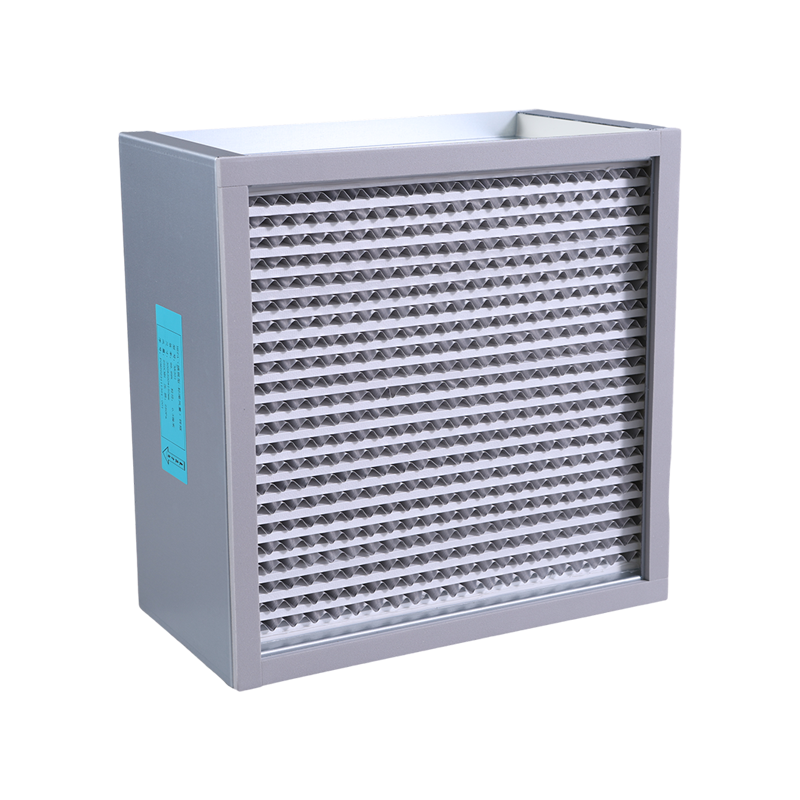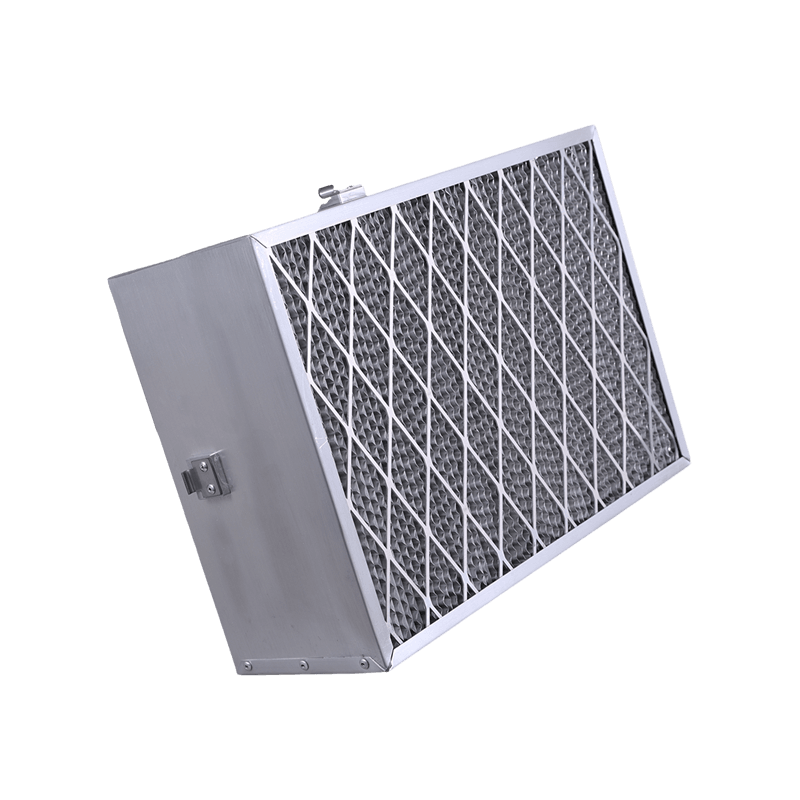Welche Vorteile bietet die Verwendung von Glasfaser für Box-HEPA-Filter? Box-HEPA-Filter Verwenden Sie typischerweise Glasfasermedien, da diese mehrere Vorteile bieten, die sie ideal für eine hocheffiziente Luftfiltration machen. Hier sind einige Vorteile der Verwendung von Glasfasermedien:
1. Effizient: Glasfasermedien sind sehr effizient und können Partikel in Submikrongröße mit einem Wirkungsgrad von bis zu 99,97 % entfernen.
2. Haltbarkeit: Glasfasermedien sind extrem langlebig und behalten ihre Form und Struktur auch bei hohen Durchflussraten und hohen Druckabfällen.
3. Hydrophob und oleophob: Glasfasermedien sind im Allgemeinen hydrophob und oleophob und tragen dazu bei, Wasser- und Ölmoleküle abzustoßen und zu verhindern, dass sich Feuchtigkeit und Öl auf dem Filter ansammeln.
4. Chemikalienbeständigkeit: Glasfasermedien sind im Allgemeinen gegen eine Vielzahl von Chemikalien beständig und tragen dazu bei, Schäden durch chemische Dämpfe und Gase zu verhindern.
5. Antimikrobiell: Glasfasermedien sind im Allgemeinen resistent gegen das Wachstum von Bakterien und Schimmel und tragen so dazu bei, biologische Kontaminationen auf dem Filter zu verhindern.
6. Geringer Widerstand: Glasfasermedien haben im Allgemeinen einen geringen Widerstand, was dazu beiträgt, die Energie zu reduzieren, die erforderlich ist, damit Luft durch den Filter strömt.
7. Geringer Wartungsaufwand: Glasfasermedien erfordern in der Regel nur sehr wenig Wartung, was dazu beiträgt, die Betriebskosten des Filters zu senken.
8. Kosteneffizienz: Glasfasermedien sind im Vergleich zu anderen Medien im Allgemeinen kostengünstig und tragen dazu bei, die Gesamtkosten des Filters zu senken.
9. Vielseitigkeit: Glasfasermedien können in einer Vielzahl von Anwendungen eingesetzt werden, darunter gewerbliche und industrielle HVAC-Systeme, Reinräume und medizinische Einrichtungen.
10. Anpassbarkeit: Glasfasermedien können an die Anforderungen spezifischer Anwendungen angepasst werden, z. B. unterschiedliche Dichten, Dicken und Anordnungen.
11. Nachhaltigkeit: Glasfasermedien sind ein recycelbares und wiederverwendbares Material, das dazu beiträgt, Abfall zu reduzieren und Nachhaltigkeit zu fördern.
12. Wartung: Die Wartung des Box-HEPA-Filters, wie regelmäßige Reinigung und Austausch, trägt dazu bei, die Leistung seiner Glasfasermedien aufrechtzuerhalten und dadurch seine Lebensdauer zu verlängern.
Warum sind Box HEPA-Filter wasserdicht und flammhemmend? Box-HEPA-Filter sind wasserdicht und flammhemmend konzipiert und tragen so zur Verbesserung ihrer Leistung und Sicherheit bei. Hier sind einige Gründe, warum Box-HEPA-Filter wasserdicht und flammhemmend sind:
1. Verhindert Wasserschäden: Wasserabweisende Eigenschaften tragen dazu bei, Filterschäden in Umgebungen mit hoher Luftfeuchtigkeit oder versehentlicher Wassereinwirkung zu verhindern. Dies trägt dazu bei, die Leistung des Box HEPA-Filters aufrechtzuerhalten und seine Lebensdauer zu verlängern.
2. Verhindert das Wachstum von Bakterien und Schimmel: Die wasserabweisenden Eigenschaften tragen dazu bei, Feuchtigkeitsansammlungen auf dem Box-HEPA-Filter zu verhindern, die das Wachstum von Bakterien und Schimmel fördern können, was die Leistung des Filters beeinträchtigen und schlechte Gerüche verursachen kann.
3. Verbesserte Effizienz: Die wasserabweisenden Eigenschaften tragen dazu bei, die Effizienz des Box-HEPA-Filters zu steigern, da sie verhindern, dass sich Feuchtigkeit auf dem Filter ansammelt, was seine Leistung beeinträchtigen könnte.
4. Reduzierter Wartungsaufwand: Die wasserabweisenden Eigenschaften tragen dazu bei, den Wartungsaufwand für den Box-HEPA-Filter zu reduzieren, da sie dazu beitragen, Feuchtigkeitsansammlungen auf dem Filter zu verhindern, die möglicherweise eine häufigere Reinigung und einen häufigeren Austausch erfordern.
5. Erhöhte Sicherheit: Flammhemmende Eigenschaften verhindern, dass der Filter im Brandfall zu einer Brandquelle wird. Dies trägt dazu bei, die Sicherheit von Filteranlagen zu verbessern.
6. Vorschriften einhalten: Wasserdichte und flammhemmende Eigenschaften können dazu beitragen, dass Box-HEPA-Filter Vorschriften und Standards für bestimmte Branchen oder Anwendungen einhalten.
7. Haltbarkeit: Die wasserdichten und flammhemmenden Eigenschaften tragen dazu bei, den Box-HEPA-Filter langlebiger zu machen, da er physischen Schäden und Umwelteinflüssen standhält, die seine Leistung beeinträchtigen können.
8. Vielseitigkeit: Aufgrund der wasserbeständigen und flammhemmenden Eigenschaften eignen sich Box-HEPA-Filter für eine Vielzahl von Anwendungen, darunter Umgebungen mit hoher Luftfeuchtigkeit, Reinräume und medizinische Einrichtungen.
9. Wartung: Die Wartung des Box-HEPA-Filters, wie z. B. regelmäßige Reinigung und Austausch, trägt dazu bei, seine wasserdichten und flammhemmenden Eigenschaften aufrechtzuerhalten, wodurch seine Lebensdauer verlängert und seine Leistung verbessert wird.
10. Schutz: Wasserdichte und flammhemmende Eigenschaften tragen dazu bei, den Box HEPA-Filter vor unbeabsichtigten Schäden zu schützen, die seine Leistung beeinträchtigen und seine Lebensdauer verkürzen können.



 简体中文
简体中文















